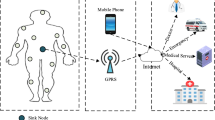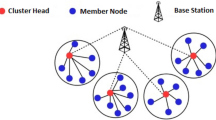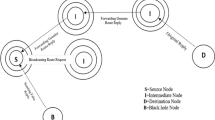Abstract
The design of energy-aware routing protocols has always been an important issue for mobile ad hoc networks (MANETs), because reducing the network energy consumption and increasing the network lifetime are the two main objectives for MANETs. Hence, this paper proposes an energy-aware routing protocol that simultaneously meets above two objectives. It first presents Route Energy Comprehensive Index (RECI) as the new routing metric, then chooses the path with both minimum hops and maximum RECI value as the route in route discovery phase, and finally takes some measures to protect the source nodes and the sink nodes from being overused when their energies are low so as to prolong the life of the corresponding data flow. Simulation results show that the proposed protocol can significantly reduce the energy consumption and extend the network lifetime while improve the average end-to-end delay compared with other protocols.








Similar content being viewed by others
References
Cheng, S. T., Li, J. P., & Horng, G. J. (2013). An adaptive cluster-based routing mechanism for energy conservation in mobile ad hoc networks. Wireless Personal Communications, 70(2), 561–579.
Sungwook, K. (2013). Adaptive online sensor clustering and routing algorithms for QoS provisioning and energy efficiency. Wireless Personal Communications, 63(4), 965–975.
Weng, C. H., & Lai, T. W. (2013). An energy-efficient routing algorithm based on relative identification and direction for wireless sensor networks. Wireless Personal Communications, 69(1), 253–268.
Samra, B., & Mohammed, B. (2013). A novel energy efficient and lifetime maximization routing protocol in wireless sensor networks. Wireless Personal Communications, 72(2), 1333–1349.
May, Z. O., & Mazliza, O. (2012). Analytical studies of interaction between mobility models and single-multi paths routing protocols in mobile ad hoc networks. Wireless Personal Communications, 64(2), 379–402.
Hadi, S., Borhanuddin, M. A., & Sabira, K. (2012). A cross layer metric for discovering reliable routes in mobile ad hoc networks. Wireless Personal Communications, 66(1), 207–216.
Sungwook, K. (2012). An ant-based multipath routing algorithm for QoS aware mobile ad-hoc networks. Wireless Personal Communications, 66(4), 739–749.
Hieu, C. T., & Hong, C. S. (2011). RAI: A high throughput routing protocol for multi-hop multi-rate ad hoc networks. Wireless Personal Communications, 60(1), 69–82.
Toh, C.-K. (2001). Maximum battery life routing to support ubiquitous mobile computing in wireless ad hoc networks. IEEE Communications Magazine, 39(6), 138–147.
Li, J., Cordes, D., & Zhang, J. (2005). Power-aware routing protocols in ad hoc wireless networks. IEEE Wireless Communications, 12(6), 69–81.
Kim, D., Garcia-Luna-Aceves, J., & Obraczka, K. (2003). Routing mechanisms for mobile ad hoc networks based on the energy drain rate. IEEE Transaction on Mobile Computing, 2(2), 161–173.
Zhang, X., Zou, F., & Wang, E. (2010). Exploring the dynamic nature of mobile nodes for predicting route lifetime in mobile ad hoc networks. IEEE Transaction on Vehicular Technology, 59(3), 1567–1572.
Zhu, J., Qiao, C., & Wang, X. (2006). On accurate energy consumption models for wireless ad hoc networks. IEEE Transaction on Wireless Communications, 5(11), 3077–3086.
Zhu, J., & Wang, X. (2011). Model and protocol for energy-efficient routing over mobile ad hoc networks. IEEE Transaction on Mobile Computing, 10(11), 1546–1557.
Ma, C., & Yang, Y. (2011). A battery-aware scheme for routing in wireless ad hoc networks. IEEE Transactions on Vehicular Technology, 60(8), 3919–3932.
Zheng, S., Wu, W., & Zhang, Q. (2012). Routing protocol based on energy aware in ad hoc networks. Journal on Communications, 33(4), 9–16.
Acknowledgments
This work is supported by National Natural Science Foundation of China (61171094), National Basic Research Program of China (973 program: 2013CB329005), 863 Program (2014AA01A705) and Key Project of Jiangsu Provincial Natural Science Foundation (BK2011027).
Author information
Authors and Affiliations
Corresponding author
Rights and permissions
About this article
Cite this article
Gu, C., Zhu, Q. An Energy-Aware Routing Protocol for Mobile Ad Hoc Networks Based on Route Energy Comprehensive Index. Wireless Pers Commun 79, 1557–1570 (2014). https://doi.org/10.1007/s11277-014-1946-1
Published:
Issue Date:
DOI: https://doi.org/10.1007/s11277-014-1946-1




